available for purchase
at this time.
Post-show Conversation with Playwright Andrew Hinderaker | COLOSSAL
 After the first Sunday matinee of COLOSSAL, director Summer L. Williams and dramaturg Ramona Ostrowski were joined via video by playwright Andrew Hinderaker from Chicago. The discussion ranged from the production process to the problematic culture of football to representations of characters with disabilities on stage, with enthusiastic audience response.
After the first Sunday matinee of COLOSSAL, director Summer L. Williams and dramaturg Ramona Ostrowski were joined via video by playwright Andrew Hinderaker from Chicago. The discussion ranged from the production process to the problematic culture of football to representations of characters with disabilities on stage, with enthusiastic audience response.
Pre-Game Press Conference
Want to hear more from the playwright? Andrew Hinderaker speaks with Dramaturg Ramona Ostrowski about the journey and appeal of “this pressure-cooker of a play.”
Ramona: Let’s have you kick us off, so to speak, by telling me a little bit about where the inspiration for COLOSSAL came from.
Andrew: It came primarily from two different places. There’s somebody in my family who’s a former athlete and has a spinal condition, and watching this person negotiate a new normal, physically, was something that was very much a part of my life. I tried to write about it in a different theatre piece in grad school, and that piece was not terribly successful in executing that story, but it did get me thinking about what it meant to tell a story physically. So that was one piece of the puzzle. Another piece was that one of my closest colleagues who runs the theater company that I’m a part of in Chicago called The Gift is an actor who uses a wheelchair. Our previous collaboration had nothing to do with disability, but working with him really opened my mind more to the intersections of theater and disability.
Also, I was down in grad school at the University of Texas at Austin, and that’s a theatre department that literally sits in the shadow of the football stadium. You know, a 100,000 person stadium that is really the biggest, most popular form of theatre at UT.
You’re not from Texas originally—did writing this play while you were there influence you?
Being there definitely amplified all of the things that were already sort of present for me. The interesting thing about Texas, I think more than perhaps any other state, is that football is so in the bloodstream at every level—Pop Warner to high school to college to the pros. I grew up in Madison, Wisconsin, which is a huge college football town, but the popularity begins in college. Certainly there’s high school football, but it’s not like Texas high school football.
 Did you play football growing up?
Did you play football growing up?
I didn’t, other than pick-up tackle games as a child. I don’t have the skill sets and abilities to play. I am pretty flow-less and grace-less. But a lot of people in my life are dancers. That’s really where Texas played a big role in this show, because UT Austin is a department of theatre and dance, and I became pretty close friends with a number of the grad student dancers. Movement really became a central point of exploration while I was down there.
You specify in the script that the role of Mike has to be played by an actor who uses a wheelchair. What made you make that decision, and have you gotten any pushback on it?
I was writing the role with my friend, Mike Thornton, in mind, and never anticipated the play would get a production, much less many! The challenge from my mentor was to write an unproducible play; to do something so big and ambitious that people would be like, “No, we can’t do this.” So initially there wasn’t anything about ability in the script because I thought, “Well, Mike Thornton’s gonna do it.” But once it became clear that we were going to get some more productions after Olney, I realized it was probably something that I should make explicit because Mike couldn’t actually do all these shows. After talking to a lot of folks in the arts and disability community, I realized that a lot of the narratives out there are about overcoming the disability, and then the role is often played by someone who doesn’t have a disability. I didn’t want to be a part of that; I made it explicit in the script because it just felt like a natural thing to do.
No one has said, “Well, oh jeez, then we’re not interested.” I think one thing that speaks to Company One and speaks to all the folks who’ve been great enough to produce this play is, if you’re going to take on a play with a cast this size, with choreography and football players and full contact hits and a drumline, you’re generally not going to be scared off by needing to hire an actor who uses a wheelchair. I think that the piece attracts companies that are drawn to both ambition and to difficult theater. Buy Sildenafil Citrate http://www.sildenafilanswers.com/buy-sildenafil-citrate-100-mg-online/
Company One Theatre is the fourth stop of this National New Play Network rolling world premiere, after Olney Theatre Center outside of DC, Mixed Blood Theatre in Minneapolis, and Dallas Theatre Center. You were directly involved with the previous three productions, right?
AH: Yeah, I was. Very much so with the Olney—pretty much the entire production there—most of the production with Mixed Blood, and at least half of it with Dallas. It’s been great. I’m so fortunate because the evolution of the piece has been so incredibly well-supported, and has really given me a strong sense of what the play wants; what the play is and what it isn’t. It’s been great because I have had the opportunity to work with different directors and different casts in theatres of different sizes. You come away from that experience with revelations for sure.
What are some specific things you’ve learned about the play through the process?
I think one thing that has been proven true from production to production, and is so vitally important, is that the play has a certain precision and relentlessness and violence that isn’t adaptable. There is a certain level of violence in this pressure-cooker of a play where it can’t be allowed to become a little bit sloppy with the movement or the rhythm of the language. If you suck in your breath and tighten absolutely every muscle of your body until everything is unbearable and uncomfortable and tight, that’s the way that the play needs to feel up until that final moment—which is partially why it’s such a short play.
Also, though, the play became about different things in different cities. At the Olney, with an older audience, it became clear that this particular production was about care-taking. In Mixed Blood’s production, there was a little more focus on disability, because that’s something the company is really focused on. And in Texas, the football piece, of course, but also the relationship between two men became what the play was about. There were a number of people who walked out of the play when the two men touched each other. And it was because this particular kind of men, these hyper-masculine football men, were touching each other in a very vulnerable way.
That’s one thing we’ve been talking about in our process—it’s not necessarily the sexuality of the characters that’s dangerous or even interesting about this story, but the intimacy between these two big guys who are so hyper-masculine in a culture where masculinity means closing off emotions and vulnerability.

Exactly. One of the things we’ve always talked about is that it’s absolutely not a coming out story. If Mike had told his father he was in love with his teammate, he would have been fine with it. The interesting thing is that he can’t tell his father because they’ve broken off all ties. Aurogra http://valleyofthesunpharmacy.com/aurogra/
Part of the reason that the play has landed with folks is because we are really drawn to this violent performance of masculinity. We find it attractive, and obviously the play is out to disrupt that, but there is something that’s truly compelling about the play for the same reasons. As a person, and part of a larger society, I’m drawn to this particular brand of masculinity that I find hypnotizing. It’s an incredibly violent game, where these men are asked to really push themselves beyond physical boundaries and to put themselves in positions of extraordinary physical risk. Without question the play is written from the point-of-view of someone who both loves football and finds it grotesque.
Broadening our scope for this last question: what’s exciting to you about the theatre right now? Why do you make plays?
Right now I’m interested in a lot of collaborations that may cut across disciplines—into dance, into sports, into magic, into these forms where people are participating in performance before an audience.
I think that one of the greatest gifts that the theatre can give is the sense of being present. Maybe it’s just me, but I’m so rarely present in my life. In theatre, generally speaking, you’re like, “Sit down, shut up, and don’t go anywhere for the next hour and a half.” If we actually embrace how demanding we’re being, then we might embrace how much we owe our audience. The contract that we’re making is that every moment is going to matter because we’re not allowing you to do something else. We’re not allowing you to look away. So this all has to matter.
That experience that people who love football have when they go to a game that is electric, where they stand on the bleachers and scream? I’m interested in that emotional electricity inside of you. Why can’t the theatre do that? Why can’t it charge us into this animalistic place? At a magic show, people lose their minds. These feats of virtuosic magic are so powerful because they’re actually making us be present; that moment that you weren’t present, you missed it.
I’m not interested in smugness or commentary; I am really drawn to theatre pieces that unabashedly wear their heart on their sleeve—that are unafraid of being emotional. Our contract with the audience is to make every moment matter. That’s the value that I aspire to.